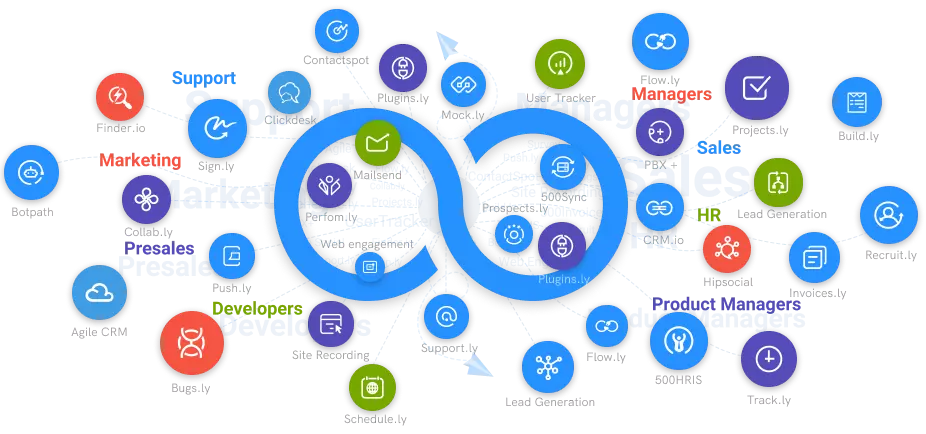How RPA Helps Companies Increase Productivity
RPA helps companies increase productivity and get maximum return on investment due to its affordable structure.
#1
Automated Repetitive Tasks
#2
End-to-End Bot Development
#3
Customized Bot Builder
#4
Unlimited Automated Workflows Management
#5
Automated Data Extraction
#6
Workflows Recording Management
#7
Rule-based Process Automation
#8
Seamless Data Management
#9
Unbelievable pricing - the lowest you will ever find
#10
Everything your business needs - 50 apps, 24/5 support and 99.95% uptime
This era is inclined more towards digitalization. Increased number of businesses and industries are automating their workflows and functions. For some industries, automation becomes a costly affair. They are still in the early stages of adopting robotic process automation. Although, with an increase in adoption, they are also experiencing an increase in ROI and reduced costs for daily processes.
A recent report by Forrester suggests that RPA will be worth $2.9 billion by 2021. RPA has proved to be a technological breakthrough for several industries as their entire business workflows become more efficient.
RPA finds the best of its applications in the following sectors:
Implementation Telecommunications Banking Customer Care Insurance Healthcare Manufacturing Finance Property Management Retail Information Technology By leveraging Robotic Process Automation, industries can automate tasks across various systems including the entire workflow, infrastructure, and other backend processes, which are mostly labor-intensive and time-consuming.
RPA can be used by industries of all sizes and eliminate the risks of human errors. Here, we walk through the major use cases of RPA implementation in various industry verticals:
RPA in telecommunication Telecommunication relies on speed, cost, and technology. They can use RPA in the following areas:
Enhanced Productivity and Scalability RPA enables the telecommunication industry to handle large volumes of data. It is the best suitable go-to-market strategy as it automates back-office processes, eliminates the need for employees to perform redundant tasks, and focus on other critical tasks.
First Call Resolution Benefits With the use of RPA bots, employees can enable software bots to rapidly access the data. This is the backbone of the telecommunication industry; being able to address the customer demands on their first call without repeated follow-ups. RPA promotes FCR rates thus ensuring customer retention and loyalty.
Cost Reduction While industries might feel that RPA is heavy on the pocket; we must also know that a single RPA license can be implemented for multiple processes; thus reducing the cost. The implementation cost is not much for ERP or Business Process management. Also, automation of tasks leads to increased ROI.
RPA In Banking Banking involves a lot of operational costs. Implementing RPA saves this cost and also reduces errors. Human tasks also become less if there is a proper utilization of RPA. Leveraging banking automation reduces the cost by 30% to 70% and reduces the turnaround time also. This is how the banking sector can leverage RPA:
Improved Customer Service Banking is cumbersome, involving a lot of customer interaction. But with RPA, banks can have ease of process in customer onboarding, verifying customer details to account, and loan inquiry. RPA helps banks reduce the turnaround time so that banks can retain their customers and maintain customer loyalty.
Automated Accounts Payable and Closure Processes Traditionally, the AP process involves gathering invoices from vendors using OCR (Optical Character Recognition), validating the data in the fields thus provided, and then processing it. Banks are utilizing RPA to automate the entire process and credit the amount automatically to the vendor’s account.
Also, one can send automated notifications to customers to notify them about furnishing necessary documents and processes account closure functions with 100% accuracy.
Credit Card And Mortgage Processing How interesting will it be if a bot is fed with rules and regulations for background checks and validations for credit cards? This is how RPA has made it easy and quick to process and dispatch the credit card. Similar is the case with mortgage processing. Traditionally, banks have to perform several scrutiny checks such as employment and credit history, etc for the customer. With RPA, the entire process has speeded up based on well-defined algorithms.
Fraud Detection RPA is best utilized for the benefit of the common man to identify potential frauds. RPA can help identify fraud beforehand and suggest ways to curb it. Automating has led to banks being able to identify accounts that are likely to cause threats and flags them. It becomes easy for banks to scrutinize these accounts and investigate fraud before it happens.
In the real world scenario, RPA has become handy for the public as well as employees to ease the banking processes. A few instances are:
Federal Bank has leveraged RPA to keep their compliance operations cost low and meet their regulatory requirement in half the time. Banks are implementing RPA to schedule loan repayment and KYC reminders to make it easy for the employees. With RPA, banks have updated automations as quickly as regulations change to keep pace with requirements. RPA For Customer Care The customer care industry is probably the most customer-facing industry. There are rule-based redundant processes that have to be carried out. RPA finds application at BPOs too. Let us see how:
Automated Data Exchange For Customer care executives, it is a data-driven world. They handle a lot of critical data about customers and gather insights from it. RPA automates the entire process and helps save time and costs by serving their customers better and faster.
Cost Control The Institute of Robotic Process Automation estimates that with the adoption of RPA, companies can reduce the operating costs by 25-50%. This can be done by allocating redundant tasks to these software bots.
Accurate and Differentiated Workflows As with RPA, human interaction reduces greatly. The workflows thus become accurate and fast. If you are using RPA, repetitive tasks are performed by the software bots; thus there is a minimum number of the workforce engaged in the process. This means there is more accuracy, no additional cost, and a lot of time saved.
RPA allows industries to offer differentiated and customized services to customers and maintain customer loyalty.
RPA in Insurance The insurance sector also involves collecting important customer data and carrying out repetitive tasks. RPA can be implemented for ensuring a better customer experience in the following ways:
Processing Claims If the insurance industry uses RPA processes, they can process claims at a faster speed; up to 75% faster than the traditional approach. RPA eliminates the paper-based processes, increasing the quality and accuracy of the entire process.
Form Registration Process Automating the insurance industry has enhanced the registration process by 40%. Artificial intelligence combined with RPA reduces the employer’s workload significantly and ensures customer satisfaction.
Regulatory Compliance Updates Made Simpler There are a lot of compliance standards and policies in the insurance industry. For instance, the HIPAA privacy rules and PCI standards. This varies from client to client. By use of RPA, banks can help their clients to stick to these compliance standards without any complications.
Risk Mitigation RPA processes the data accurately, reducing the risk for both internal and external sites. This ensures delivery of work at a faster pace and with 100% accuracy.
RPA In Healthcare Industries Healthcare is seeing exponential growth in the volume of patients. Prioritizing cost reduction and efficiency thus becomes a major benefit of RPA implementation for the healthcare industry. Here is how the healthcare industry benefits from RPA services.
Savings on Human Workforce There is a lot of staff engaged to perform mundane and repetitive tasks in hospitals etc. implementing RPA can replace the workforce with automated systems so that the workforce can spend time on core activities rather than perform intense and mundane tasks.
Increased Throughput With Improved Quality Healthcare personnel are more required to handle the large volume of patients that need individual care and attention. While personnel takes care of the patients, RPA can take care of maintaining medical records of patients, entry processing, claim processing, etc with lower costs.
A few use cases or RPA in the healthcare industry could be:
RPA bots can simplify patient appointment scheduling according to diagnosis, location, availability of doctor, etc. RPA bots can record patient data that can be used to generate analytics and deliver patient tailored treatment. RPA softwares can also calculate the bill amount accurately, considering the tests cost, medicine cost, food bills, doctor charges etc. RPA In Manufacturing Industries Robotic process automation has made manufacturing companies shift their production units to automated software bots. Tasks like product assembly, quality checking, and packaging and back-end processes have obtained a 40% savings in operational costs via automation. The major use cases are:
RPA In Manufacturing Industries
BOM Made Simple The Bill Of Materials with the list of raw materials for new product creation is detailed information for the manufacturing industry. Leveraging RPA can lead to faster, accurate, and on time product creation.
Data Migration With RPA, proper planning and execution of moving data from old to new systems become smooth with reduced cost and timings. This is a major shift from the traditional way of migrating data.
ERP Automation Automation has made resource planning easier. Employers can move their focus away from managing inventory, accounts payable, receivable, and other reports.
Apart from these major industries, RPA can also be used in the following industries:
RPA In Finance RPA can be leveraged to maintain customer accounts, creating various reports, migrating data between accounts, updating loan, and mortgage data that otherwise are a time-consuming task for employees.
RPA also helps financial services meet compliance standards with changing rules. As the technology is accurate, it provides significant risk reduction in the financial sector. Faster RPA cycles enhance finance processes too.
RPA In Property Management With RPA, property owners find it easy to manage their property units systematically. Automated processes can be leveraged to help property owners reduce the turnaround time, improve the efficiency of business processes, and save costs.
RPA In Retail Sector Retail business also includes a lot of processes that need to be automated. Retail solutions can implement RPA for automatic inventory monitoring, email sales, extraction of critical information from manufacturer websites, etc.
RPA In Information Technology Industries A major part of the workforce is utilized by the IT industry. They can use automation for employee onboarding, due diligence, payroll processing, task tracking, and CRM updating. It helps in saving costs and time.
There probably is no industry that is untouched by the use of RPA for enhancing their business outcomes. Be it optimizing end-to-end automation initiatives or empowering employees to be more efficient in handling multiple projects. Botpath is one such tool developed under https://500apps.com/ that empowers RPA as a powerful technology to reduce costs and enhance productivity. Researchers at Hadoop estimate that the potential savings that companies will experience with RPA by 2025 is between $5 trillion to $7 trillion.Identify your needs and implement RPA to your business for positive outcomes.





